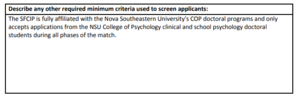Is it a "bias" if it's a conclusion drawn by the outcome statistics, including their EPPP pass rates and licensure rate?
What about the program's use of captive internship sites to inflate their match rate?
Learn more about the doctoral internship programs at the College of Psychology.

psychology.nova.edu
They're purposefully obfuscating the match rate with this tactic, which prevents prospective students from realizing the problems with the program, instead of, you know, actually improving the quality of their program to increase the match rate?
Thus, their match rate is deceptive and therefore isn't really comparable to programs with similar rates that don't rely on captive sites.
Um, this is not a problem at all programs. I may not get along equally well with all faculty in my program (some I rarely see, especially with COVID, and with others I just have cordial, but relatively uninvolved relationships), but it's readily apparent that they are very competent and productive, which is why they hold their positions.
Or you could get an appreciation of this like every other programs does, i.e., through robust didactics, research, and practica. Do you really not see how this is an indictment of Nova's greedy practices in admitting students who are not (maybe never will be) prepared for doctoral training?
This is such a weird spin on having massive cohorts. Individual Nova cohorts are twice as large as my entire program, which is absolutely going to mean you won't get anything close to the kind of mentoring you'd receive in funded programs, though I guess you may not want that if some of the faculty who be mentoring you are questionable, at best.
Is it just a "handful?" That Nova had to start using a captive internship site to gets internship match numbers up beyond 40-50% indicates that it is a broader, more systemic problem.
Also, didn't you just say that this was a good thing that the program admits too many students who are operating below the average for doctoral trainees?
What might those be and are they worth the sticker cost compared to getting those training opportunities by other means, like internship, post doc, or post licensure training?
That "non-empirical studies" are options for the dissertation milestone indicates the insufficiency of Nova's research training, which is a core competency of doctoral training.
This is disingenuous. That there might be some good or even great psychologists coming out of a given program is not the point. It's important to look at modal outcomes and discern whether these people are succeeding because of their program (what is supposed to happen) or in spite of it.
A program should be helping students do these things and not leave it up to them to
The program has a bad reputation based on actual data. Therefore, it's graduates need to demonstrate that they are the exceptions to the poor quality training offered by their program. Compare this to most other psychologists who don't carry around that baggage and their program is an asset to help them and not an albatross around their neck to be overcome.
Again, the objective data is that they use a captive internship to artificially inflate their match rates and it's a practitioner focused program but their EPPP pass rates, licensure rates, and other clinical outcomes are below clinical science and other research-focused programs.



